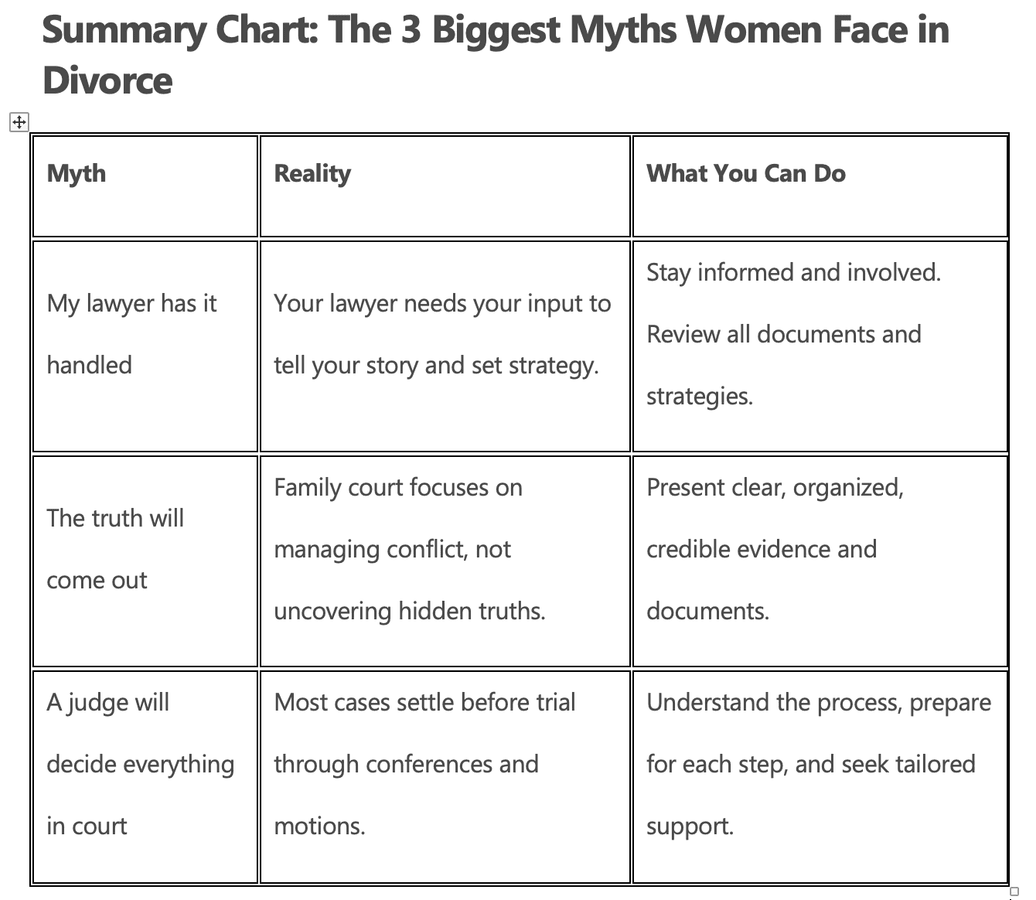
The 3 Biggest Myths Women Face in Divorce ⚖️💔
2 minute read
The 3 Biggest Myths Women Face in Divorce ⚖️💔
Divorce is one of the most challenging journeys a woman can face. It’s a process filled with uncertainty, emotional turmoil, and legal complexities. Yet, many women enter family court with misconceptions that can cost them time, money, and peace of mind. As your legal education guide, I’m here to help you cut through the noise and see the family court system for what it really is — so you can approach your case with clarity, confidence, and control. Let’s debunk the three biggest myths women face in divorce and empower you to take charge of your future.
Myth #1: My Lawyer Has It Handled 🧑⚖️
It’s tempting to think that hiring a lawyer means you can sit back and relax while they do all the work. But here’s the truth: even the best lawyer can’t tell your full story or make strategic decisions without your input. This is your life, your future, and your case.
If you don’t know what’s being filed on your behalf, how your affidavit reads, or exactly what you’re asking for, you risk losing control of your own case. Family court rewards those who are informed—not just those who are represented.
· Stay actively involved in your case.
· Ask questions about every document before it’s submitted.
· Understand the legal strategy and goals.
Remember, your lawyer is your guide, but you are the captain of your ship.
Myth #2: The Truth Will Automatically Come Out 🕵️♀️
Family court is not a truth-seeking mission. It’s designed to manage conflict, encourage settlement, and move cases along. Judges don’t have the time to read every word or piece together your story from hints and hopes. They make decisions based on what’s clearly presented to them.
This means your documents need to be clear, organized, and credible — even when the facts are hard to share.
· Be precise and factual in your affidavits.
· Present evidence in a logical, easy-to-follow way.
· Don’t rely on the hope that “the truth will come out” on its own.
Clarity is power in family court. The better you can show what you mean, the stronger your case will be.
Myth #3: A Judge Will Decide Everything in Courtroom Drama 🎭
Most cases don’t reach a dramatic courtroom trial. Instead, you’ll navigate through steps like case conferences, motions, and settlement discussions. Many important decisions happen long before you ever speak directly to a judge.
In cases involving high conflict or abuse, the pressure to settle can be intense — especially on the person trying to escape harm. Knowing what happens at each stage and how to prepare will protect you from being rushed or overwhelmed.
· Understand each phase of the process.
· Show up prepared with your facts and documents.
· Seek support tailored to your situation.
Preparation, structure, and strategy—not courtroom theatrics—are what truly influence outcomes.

Take Control: Be Awake, Not Fearless 🌟
You don’t need to know everything or be fearless. But you do need to be awake and aware. No one is coming to rescue you — not your lawyer, not the judge. The family court system responds to preparation and clarity.
Here’s a simple but powerful step you can take today:
· Create a dedicated space—a folder, notebook, or private digital file—called “Family Court Strategy.”
· Use this space to track every important date, deadline, and document.
· Keep this space factual and focused—this is not a venting zone, but your credibility vault.
Because credibility isn’t just what you say — it’s what you can show.
Divorce is a complex process, but with the right mindset and preparation, you can navigate it more confidently. Remember, knowledge is your strongest ally. Stay awake, stay organized, and take control of your story. You’ve got this. 💪